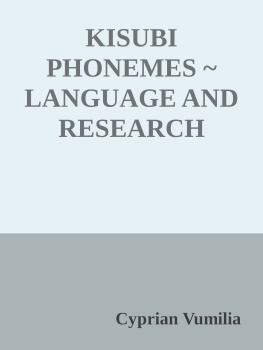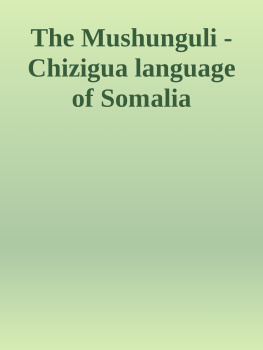INTRODUCTIONTO THE LANGUAGE
Subiis a Bantu language mainly spoken in Biharamulo, one of the districts of KageraRegion in the North Western part of the Tanzania. According to Mradi wa Lugha za Tanzania (MLT,2009) the language has 128,438 speakers in Kagera Region and 135,211 speakersin the country.
Thelanguage is not described. Even in the renowned and detailed classification ofBantu languages by Guthrie (1948, 1971,) and the well documented language listby Maho (1999, 2009) the language is not mentioned anywhere. What is certain isthat the language belongs to the Niger-Congo family and to group 20 inGuthries classification since in this category one finds Nyambo, Haya, Zinza,Kerewe and Jita; all of them have mutual intelligibility with Subi.
Thedegree of mutual intelligibility between Zinza and Subi speakers is high.Similarly, Nyambo and Haya have higher mutual intelligibility with Subi. ButZinza has a low degree of mutual intelligibility with Nyambo and Haya. Thegeographical dispersion of speakers of these languages justifies the differingstate of mutual intelligibility shared by the languages. The Subi peoplegeograghically share borders with Nyambo and Haya in the North East ofBiharamulo. But the Zinza do not share borders with Nyambo and Haya, ratherthey share borders with the Subi in the East of Biharamulo.
Thereis no any standard conventional orthography for this language because thelanguage is not described and hitherto, no documentation has been found either inthe language or on the language. This document is an attempt to document thislanguage. The writer has adopted the Kiswahili established standard andconventional orthography to be used for the language. The orthography isaccording to Kihore, Massamba & Msanjila (2008). Besides, the littlewritten information one can find about the language has some inaccuracies. Forinstance, some writers interchange Subi with Shubi, while the two are distinctlanguages although both are spoken in the same region of Kagera. Lewis, Paul,Simon & Charles (2015) give a lot of information on Subi but theinformation cannot be taken for granted. The language is mistaken to be Shubi. The writers state that thelanguage has the following alternate names: Kishubi, Kisubi, Shuwi, Sinja,Sinya, Subi and Urushubi; this should be accepted sparingly since it is forinstance certain that, Kisubi is quite different from Kishubi. Kishubi, Shuwiand Urushubi seem to refer to Shubi; Kisubi and Subi are synonymous (but do notmean Shubi); and Sinya and Sinja seem to refer to Zinza. It is not debatableZinza and Shubi are distinct languages.
Regardinglexical similarity, it is argued that the language has lexical similarity withsome languages: 85% with Hangaza, 77% with Rundi and Ha, 71 % with Kinyarwandaand 49% with Sumbwa (Lewis, Paul, Simon & Charles, 2015). However, anintensive study is required before a conclusion can be made taking into accountthat Subi is mistakenly taken to be Shubi.
Available literatures show that the languageis endangered. In 1978 Subi had an estimated number of 153,000 speakers (Lewis,Paul, Simon & Charles, 2015). In recent findings by MLT (2009), statisticsshow that the language has 135,211 speakers. While the actual number ofspeakers might be difficult to establish with accuracy due to rapid dispersionof people in the country; the number of Subi speakers is obviously decreasing.The reasons for the decrease are evident. First of all, there is significant contactbetween Subi native speakers and other people from different parts of Tanzaniaresulting into a tendency to use Swahili more than other native languages. So,a few people in the new generation are exposed to learning Subi. Second, theSubi people have been noted to be fewer in number throughout the history ofthis country. The number of Subi speakers is too low that even amongTanzanians, very few people recognize that there is a native language calledSubi and that there are people called Subi. The evidence for this has been lack of interest to explore, to studyand to write documentations on the language.
2. KISUBI PHONEMES
Kisubiis a Bantu language with a five vowel system
Table1: Short vowels in Subi
S/N | Orthography | IPA | Phonetic Transcription | Written form | Gloss | | a | [ a ] | [aka] | A ka | this | | e | [ ] | [zi] | E zi | these | | i | [ i ] | [iga] | Ibh e ga | shoulder | | o | [ o ] | [ogwo] | O gwo | that | | u | [ u ] | [omuzuni] | om u zuni | helper |
|
|
Source:Vumilia (2016: )
Thereare 5 long vowels in the language: /a:/, /ii:/, /:/, /o:/ and /u:/ which occurinternally and in word initials but never in word finals as shown in Table 2.
Table2: Long vowels in Subi
S/N | Orthography | IPA | Phonetic Transcription | Written form | Gloss | | aa | [ a: ] | [ka:ka] | k aa ka | grandmother | | ii | [ i:] | [i:se] | Iise | his/her father | | ee | [: ] | [kuh:ma] | kuh ee ma | to breath | | uu | [ u: ] | [ kuhungu:ra] | kuhung uu ra | to inherit a wife | | oo | [ o: ] | [ kugo:ra] | kug oo ra | to disturb |
|
Source:Vumilia (2016: )
Thesevowels appear in specific words and their usage in the words is not optional.Lengthening of vowels (which is irrelevant for this study and wont beillustrated here) does exist in the language but for pragmatic or deicticpurposes.
The long vowels as illustrated in Table 2should not be confused with lengthened vowels. These vowels occur in specificwords and their usage is not optional. The sample words given in the table aresave an illustration for some words in which they are used.















